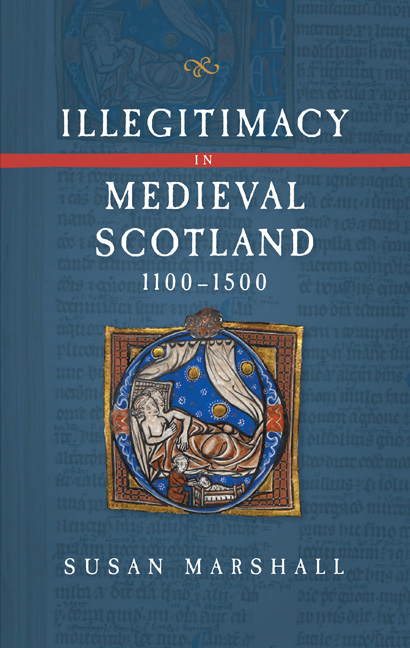Book contents
- Frontmatter
- Dedication
- Contents
- List of Tables
- Preface
- Acknowledgements
- Abbreviations
- Introduction
- 1 Church law and Scottish Families
- 2 Illegitimacy and Inheritance
- 3 Illegitimacy and Royal Succession I: Before the Great Cause
- 4 Illegitimacy and Royal Succession II: from the Great Cause to James I
- 5 Wives, Daughters, and Sisters
- 6 Church Careers and Sacrilegious Bastards
- 7 Illegitimacy in Political Life
- Conclusion
- Appendix I Scottish kings and their illegitimate offspring
- Appendix II Illegitimate sons of Scottish kings
- Timeline of key events
- Bibliography
- Index
- Frontmatter
- Dedication
- Contents
- List of Tables
- Preface
- Acknowledgements
- Abbreviations
- Introduction
- 1 Church law and Scottish Families
- 2 Illegitimacy and Inheritance
- 3 Illegitimacy and Royal Succession I: Before the Great Cause
- 4 Illegitimacy and Royal Succession II: from the Great Cause to James I
- 5 Wives, Daughters, and Sisters
- 6 Church Careers and Sacrilegious Bastards
- 7 Illegitimacy in Political Life
- Conclusion
- Appendix I Scottish kings and their illegitimate offspring
- Appendix II Illegitimate sons of Scottish kings
- Timeline of key events
- Bibliography
- Index
Summary
Before the thirteenth century, the expectation of a medieval Scot that he (and sometimes she) might succeed to heritage was not necessarily linked to confidence that his parents’ union was a marriage conforming to the canon law definition of the term. Evidence from the twelfth century, though patchy, suggests that some fathers were concerned to ensure only legitimate children were recognised as heirs, while others understood heirship rights to inhere in other factors, to do with the perceived competence of sons or brothers to manage the estates.
The thirteenth century was a turning point. The Church's development of settled definitions of lawful marriage, legitimacy and illegitimacy, and its dissemination of the compilation of decretals known as the Liber Extra, occurred at around the same time as the enlargement in Scotland of the range of legal instruments and processes in royal law intended to ensure estates came into the possession of lawful heirs. Together these created a legal environment in which succession to estates was more widely understood to be the sole prerogative of the legitimate, and inheritances could be more readily challenged on grounds of a claimant's illegitimacy.
A series of high-profile political events and disputes in thirteenth-century Scotland centring on illegitimate succession, in relation to the earldoms of Menteith, Galloway, Mar and Lennox, and in relation to the kingdom itself – the killing of the last Meic Uilleim, the attempted legitimation of Alexander II's daughter Marjorie, and the Great Cause – drove home the message that illegitimacy and heirship were incompatible.
Arriving at this position was not a straightforward process. Some indication of its complexity can be seen at the national level, in the matter of inheritance of the throne. Donnchad II (d. 1094) is the first king of Scots to be called illegitimate in our sources. Writing between six and thirteen years after Donnchad's death, Turgot implies Donnchad's illegitimacy by saying that, of Mael Coluim III's sons, only the sons of Margaret were born of a legal marriage. Turgot's claim goes further than saying Mael Coluim was not lawfully married to Donnchad's mother: he says that there were no legal marriages in Scotland before that of Margaret and Mael Coluim.
- Type
- Chapter
- Information
- Illegitimacy in Medieval Scotland1100-1500, pp. 191 - 195Publisher: Boydell & BrewerPrint publication year: 2021



